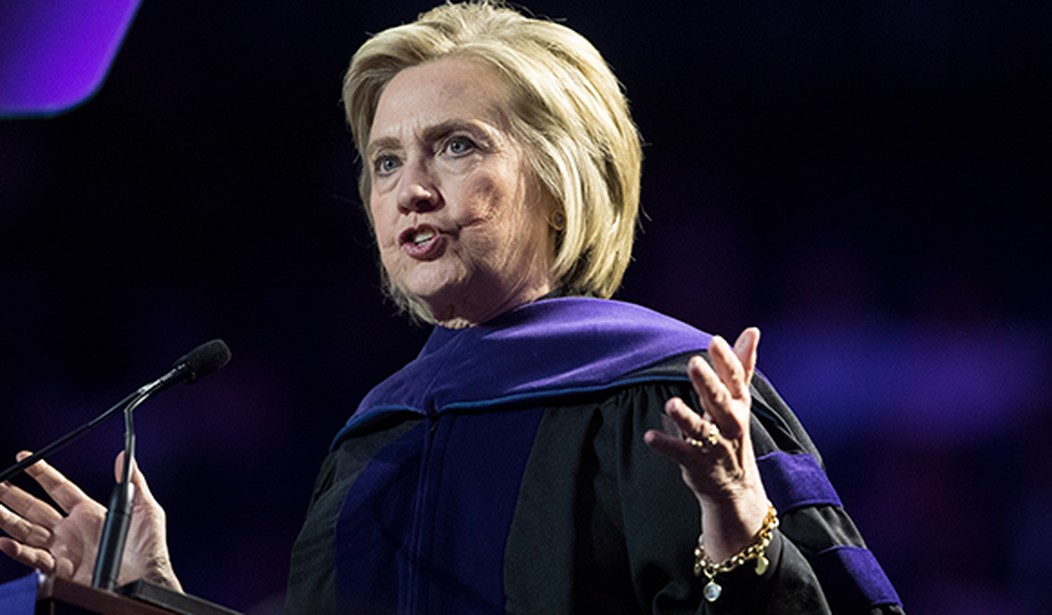The consensus view on the right is that Hillary Clinton was a primary reason for Donald Trump's success in 2016. But not all conservatives agree about why that was.
For devotees of the Trump-as-savior narrative, Clinton — and all the allegedly nefarious forces at her beck and call — was a uniquely formidable opponent. Defeating her required a different kind of Republican, one who'd be willing to fight as dirty and as tough as the Democrats. This was a "Flight 93 election," and Trump was the hero we needed to storm the cockpit.
Others on the right see it differently. It wasn't so much that Trump was the one person who could beat Clinton, but that she was the one candidate he could beat. In other words, it was only thanks to the fact that she was so unpopular that Trump had a chance. Trump-reluctant Republicans and independents could be persuaded that he was better than Clinton — when presented with a binary choice.
The latter seems vastly more plausible for the simple reason that Trump didn't have to convince those voters that Clinton was unlikable and a little scary; he simply had to exploit their pre-existing opinion of her. Indeed, Trump's continued obsession with bashing Clinton points to how central she is to his identity.
This has consequences for 2020 because the White House's entire strategy boils down to making Trump's opponent more unlikable than he is. If Trump wasn't responsible for Hillary's unfavorable numbers in the first place, it remains to be seen whether he can Hillaryize another Democrat.
It may not be all that hard, though, because the Democrats are doing everything they can to keep the Flight 93 panic alive on the right. They're doing this by running so far to the left that many Trump-skeptical Republicans feel as if they have no choice but to vote for him again. (I hear this from my fellow conservatives every day.) Democratic candidates have openly praised socialism, the Green New Deal, the abolition of private insurance, voting rights for incarcerated felons, federal funding of abortion late into pregnancy, confiscatory "wealth taxes," and even the right to sex-change operations paid for by taxpayers.
Recommended
And here is where I think Clinton's true historical significance isn't being recognized. Again, conservatives (including yours truly) invested a lot of time and energy in shaping public perceptions of Clinton. But the blame — or credit — doesn't just go to the right. Clinton herself did much to help the effort. She was never the natural politician her husband was. She lacked his gift for reading the electorate and speaking to voters' concerns. She collected all of her husband's baggage without any of her husband's skill at deflecting criticism. She wasn't very likable.
This was a huge advantage for Bernie Sanders in 2016. He came way closer to beating Clinton in the primaries than most people thought he would by tapping into the passion of the base and the frustrations of other Democrats who didn't relish a Clinton dynasty and disliked both Hillary personally and the corrupt practices of the establishment she represented. She ran on the implied claim that it was simply her "turn" to be president — a poisonous framing in a populist moment (just ask Jeb Bush). In retrospect, not being Hillary was almost as big a boon for Sanders as it was for Trump.
If the Clinton machine had not scared away more talented and resourceful politicians from running in 2016, it's possible that someone other than Sanders would have captured the passion of the party, just as Obama did when he toppled Hillary as the inevitable nominee in 2008.
But that didn't happen, and as a result, the Democratic Party got the message that Sanders-style socialist populism was the key to success, just as the GOP has concluded that Trump-style nationalist populism is the future of the right.
Sanders' frustration at no longer being the undisputed voice of the base is palpable. "They said our ideas are crazy and wild and extreme," he recently complained. "And now it turns out all of the other candidates are saying what we said four years ago."
He's right.
Of course, there are larger historical forces at work here, but it sure looks like Hillary Clinton's candidacy was an inflection point, because it galvanized not only the GOP's turn toward nationalism but the Democrats' turn toward socialism. She'll never be president, but she's made history nonetheless.

























Join the conversation as a VIP Member